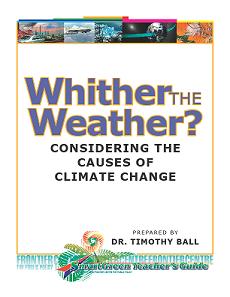 The global warming issue needs balance. This guide provides science that is not part of the general debate. Some would argue that it is biased. This is partly true, but necessary because there is a need to balance what is generally known with what is not generally known. There is also a need to indicate how information is misrepresented or distorted. The Guide does not comment on the motive behind what has happened or why.
The global warming issue needs balance. This guide provides science that is not part of the general debate. Some would argue that it is biased. This is partly true, but necessary because there is a need to balance what is generally known with what is not generally known. There is also a need to indicate how information is misrepresented or distorted. The Guide does not comment on the motive behind what has happened or why.
Temperature trends are a function of the period chosen. The world warmed since the 1680s and reached a peak in the 1940s, but has slightly cooled since then, as satellite data shows. So what is the discussion concerning global warming all about? Answer, the scientifically unsupportable claim that the warming is due to increases in atmospheric carbon dioxide from human sources. The warming since 1680 correlates with changes in the sun, not carbon dioxide. Suggesting that CO2 is a pollutant confuses the issue, but also distracts from dealing with real pollution issues.
Of course we should also work to reduce consumption of fossil fuels! There are some very good reasons; it’s a finite resource, it can produce poor air quality in concentrated urban areas, it will save money in the long term. Climate change is simply the wrong and worst reason for urging the reduction. Many countries are beginning to realize this and there is a significant shift to nuclear energy as a ‘cleaner’ source of almost unlimited energy. There are other alternative energies such as hydrogen, solar, wind and tidal, but most of these are not viable or available in the quantities we require. Many only appear to be good alternatives because government subsidies distort the realities.
The suggestion is that the teacher should not make any judgments about climate change or alternative energies, but challenge the students to argue against the prevailing wisdom. It is a rigorous and self-educating technique so effective in debates.
The teacher can have the student research alternative energies with the same scientific rigour that is suggested in this unit on climate change. Pose the question asked by Aaron Wildavsky of his students that became the title of his book, Yes, But is it True?” The main reason students should learn this approach is because it is how science must work. You don’t seek to prove something true to try to show it is not true. Karl Popper said it best, “Our belief in any particular natural law cannot have a safer basis than our unsuccessful critical attempts to refute it.”
View and print the entire resource:
 The global warming issue needs balance. This guide provides science that is not part of the general debate. Some would argue that it is biased. This is partly true, but necessary because there is a need to balance what is generally known with what is not generally known. There is also a need to indicate how information is misrepresented or distorted. The Guide does not comment on the motive behind what has happened or why.
The global warming issue needs balance. This guide provides science that is not part of the general debate. Some would argue that it is biased. This is partly true, but necessary because there is a need to balance what is generally known with what is not generally known. There is also a need to indicate how information is misrepresented or distorted. The Guide does not comment on the motive behind what has happened or why. 

